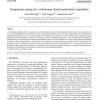Free Online Productivity Tools
i2Speak
i2Symbol
i2OCR
iTex2Img
iWeb2Print
iWeb2Shot
i2Type
iPdf2Split
iPdf2Merge
i2Bopomofo
i2Arabic
i2Style
i2Image
i2PDF
iLatex2Rtf
Sci2ools
102
Voted
AEI
2005
2005
Comparison among five evolutionary-based optimization algorithms
Evolutionary algorithms (EAs) are stochastic search methods that mimic the natural biological evolution and/or the social behavior of species. Such algorithms have been developed to arrive at near-optimum solutions to large-scale optimization problems, for which traditional mathematical techniques may fail. This paper compares the formulation and results of five recent evolutionary-based algorithms: genetic algorithms, memetic algorithms, particle swarm, ant-colony systems, and shuffled frog leaping. A brief description of each algorithm is presented along with a pseudocode to facilitate the implementation and use of such algorithms by researchers and practitioners. Benchmark comparisons among the algorithms are presented for both continuous and discrete optimization problems, in terms of processing time, convergence speed, and quality of the results. Based on this comparative analysis, the performance of EAs is discussed along with some guidelines for determining the best operators f...
Related Content
| Added | 15 Dec 2010 |
| Updated | 15 Dec 2010 |
| Type | Journal |
| Year | 2005 |
| Where | AEI |
| Authors | Emad Elbeltagi, Tarek Hegazy, Donald E. Grierson |
Comments (0)

